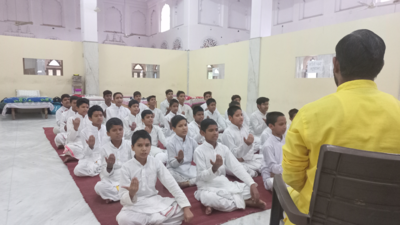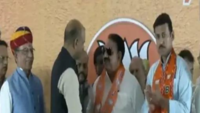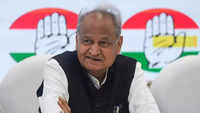- News
- India News
- No mobile, only mantras: In poll-bound Rajasthan, budding pandits line up for vedic education
Trending
This story is from November 13, 2023
No mobile, only mantras: In poll-bound Rajasthan, budding pandits line up for vedic education
A Ved Vidyalaya in Jaipur, Rajasthan is providing Vedic education to students who learn up to 2,000 mantras from the Yajur Veda. The school, established in 2017, is part of the 26 Ved Vidyalayas in the state. The chief minister of Rajasthan, Ashok Gehlot, has allocated funds to renovate Sanskrit Mahavidyalayas, Vidyalayas, and temples. The students have a strict schedule, starting at 5 am and ending at 10 pm, with only a short break for playing and chores.

Photo/ TNN
It is evening at the Khole ke Hanumanji temple, 11 km outside Jaipur city and devotees are headed back after a day-long katha. Young voices chanting vedic mantras echo across the fast emptying-temple hall. Boys dressed in white kurta-pyjama move their hands to the beat of the chants. The 29 students are enrolled in the Ved Vidyalaya, housed in the temple premises, run by the Narwar Ashram Sewa Samiti where they receive vedic education.
Over a period of five years the disciples learn as many as 2,000 mantras from the Yajur Veda, and the intricacies of yagya shikha and jyotish gyaan. The school was started in 2017 and is among the 26 Ved Vidyalayas running in poll-bound Rajasthan.
The Vidyalaya’s bare premises with no screens or technology do give the feeling of stepping back in time. Students have a regimented schedule that begins at 5 am and continues till 10 pm. The day begins with morning prayers, breakfast followed by two hours of vedic education before they head to a regular school to be taught subjects like Maths, Science, and Social Sciences. At 4 pm when school ends, the students get the only free time during the day to play and finish their chores. The evening is spent in prayers, finishing homework before they turn in for the day.
It is a hard life, admits their teacher Acharya Pawan Kumar. “The children come to the vidyalaya when they are 11-12 years-old so it takes them some time to live without their parents,” he says. Another challenge is the lack of devices in their lives. The dedication required is absolute and there is no room to slack. “When the students want to talk to their parents, they use my mobile,” Kumar adds.
Twelve-year-old Daksh Gautam joined the school a few months back. “The first two months were hard. I missed home and my parents. But slowly I got used to living here and have even made friends,” he says. Gautam wants to be a priest like his uncle as does 16-year-old Aditya Sharma who is in his fifth year. “I am juggling my class X board studies and Vedic studies,” he says. A common thread amongst the students is that they come from low-income families and often their relatives are priests and have studied in such schools.
According to Kumar the popularity and awareness of Vedic education is increasing, and the school received 100 applications. “There are many avenues for them. Our students take up priesthood, teaching, jobs as dharam gurus in the defence forces, and astrology,” he says.
Braj Mohan Sharma, mandir trustee, says that they have plans to expand the school to accommodate 20 students, set up a computer, library and vedic library for students but find government support lacking. “We get Rs 500 a month for every student, which is woefully inadequate. Most of the funding is through the trust which relies on donors,” he says.
Vikas Sharma, a teacher at the ved vidyalaya in Pitambhara Peeth, also on the outskirts of Jaipur, agrees. “This education and way of life demands rigorous discipline but our salaries are limited to Rs 8,000 a month. It has not been raised for the last decade,” he says.
Over a period of five years the disciples learn as many as 2,000 mantras from the Yajur Veda, and the intricacies of yagya shikha and jyotish gyaan. The school was started in 2017 and is among the 26 Ved Vidyalayas running in poll-bound Rajasthan.
Assembly elections 2023: Will 7 guarantees good enough for Ashok Gehlot to retain power in Rajasthan?
Though started during the BJP regime, Rajasthan CM Ashok Gehlot has made attempts at outreach to the Hindu community in recent months. In the state budget in January this year, he announced 13 new Ved Vidyalayas in districts that do not have one, while also announcing Sanskrit Mahavidyalayas in 16 districts. The government allocated Rs 20 crore to renovate Sanskrit Mahavidyalayas and Vidyalayas, and Rs 140 crore was earmarked to restore and renovate temples. The allocations are in line with the narrative of harking back to India’s glorious past. The CM has also been on temple visits recently to burnish his Hindu credentials. But whether it will meet its mark remains to be seen in the state polls.
The Vidyalaya’s bare premises with no screens or technology do give the feeling of stepping back in time. Students have a regimented schedule that begins at 5 am and continues till 10 pm. The day begins with morning prayers, breakfast followed by two hours of vedic education before they head to a regular school to be taught subjects like Maths, Science, and Social Sciences. At 4 pm when school ends, the students get the only free time during the day to play and finish their chores. The evening is spent in prayers, finishing homework before they turn in for the day.
It is a hard life, admits their teacher Acharya Pawan Kumar. “The children come to the vidyalaya when they are 11-12 years-old so it takes them some time to live without their parents,” he says. Another challenge is the lack of devices in their lives. The dedication required is absolute and there is no room to slack. “When the students want to talk to their parents, they use my mobile,” Kumar adds.
Twelve-year-old Daksh Gautam joined the school a few months back. “The first two months were hard. I missed home and my parents. But slowly I got used to living here and have even made friends,” he says. Gautam wants to be a priest like his uncle as does 16-year-old Aditya Sharma who is in his fifth year. “I am juggling my class X board studies and Vedic studies,” he says. A common thread amongst the students is that they come from low-income families and often their relatives are priests and have studied in such schools.
According to Kumar the popularity and awareness of Vedic education is increasing, and the school received 100 applications. “There are many avenues for them. Our students take up priesthood, teaching, jobs as dharam gurus in the defence forces, and astrology,” he says.
Braj Mohan Sharma, mandir trustee, says that they have plans to expand the school to accommodate 20 students, set up a computer, library and vedic library for students but find government support lacking. “We get Rs 500 a month for every student, which is woefully inadequate. Most of the funding is through the trust which relies on donors,” he says.
Vikas Sharma, a teacher at the ved vidyalaya in Pitambhara Peeth, also on the outskirts of Jaipur, agrees. “This education and way of life demands rigorous discipline but our salaries are limited to Rs 8,000 a month. It has not been raised for the last decade,” he says.
End of Article
FOLLOW US ON SOCIAL MEDIA












